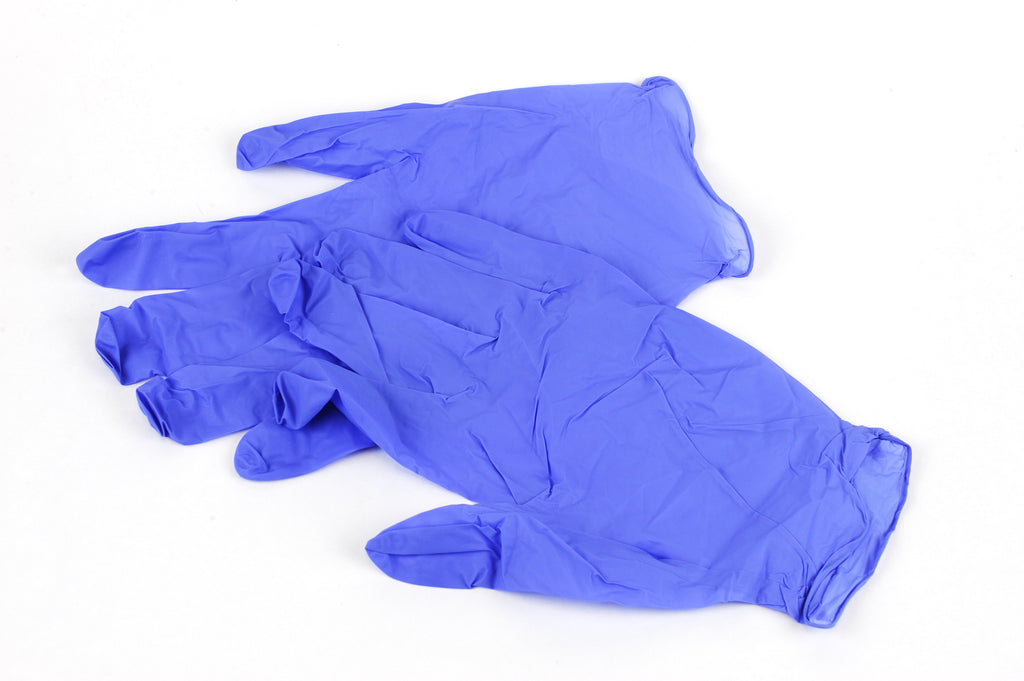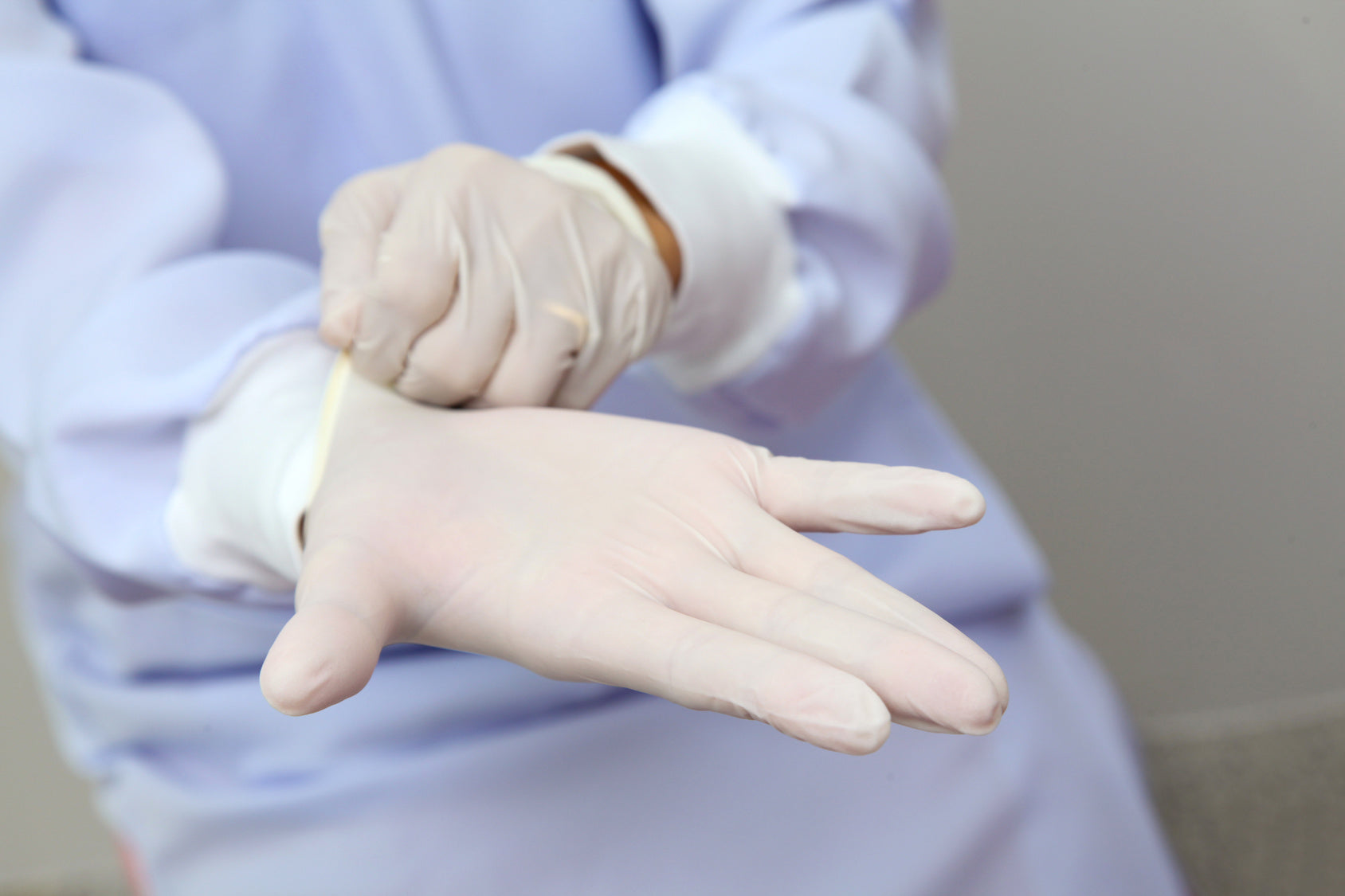
Which Disposable Glove Material is Right For You?
Do you have specific jobs that you must complete for work but are worried about contamination or potential injuries?
Let's take a look at the various types of disposable gloves that one might use in a chemical environment, housekeeping, or food industry.
You want to be certain you have the right protection.
Let's look at the different types of disposable gloves available for purchase.
Disposable Glove Material Choices
We are going to go through a few types of gloves and discuss what situations they are best for.
Nitrile
Suited for:
- Mechanics
- Medical experts
- Individuals with allergies to latex
- Laboratories
- Contact with food
- Strength and chemical splash resistance
Why Nitrile Gloves?
Nitrile gloves are a popular choice for many different industries. They are resistant to a variety of chemicals while still having decent ductile properties.
Nitrile is created using a synthetic rubber. This makes them an excellent swap for those who are allergic to latex. It does not contain the same protein that causes the allergic reaction.
What To Contemplate
When working with electrical, nitrile gloves should not be worn. Make sure that the gloves you buy are chemical resistant before working with hazardous chemicals. Permeation rates will vary depending on the glove and compound.
Nitrile rubber has a higher tensile strength and higher resistance to puncture than natural rubber latex. Nitrile rubber is resistant to a wide range of chemicals.
Latex Gloves
Suited for:
- Medical professionals
- Those employed in the beauty and Solon business
- Those looking for better fit and dexterity
- Biodegradable features for green practices
- A glove that fits like another skin
- Those who need an increased level of touch sensitivity.
Why Latex Gloves?
The positives of latex are, it fits like another skin and brings another level of sensitivity to help make sure the task you are working on is of a high standard.
Latex disposable gloves offer a significant amount of flexibility, allowing for a steady hand and fluid movement.
Latex is reliable and durable. It accomplishes an excellent barrier against infectious substances and stops cross contamination.
Some protection from exposure to dangerous chemicals.
What to Consider
Some people suffer from allergies to latex. You want to check this beforehand if you are allergic or your patients/customers.
Latex is a green-friendly option and is made up of biodegradable material. These gloves can be thrown away and not damage the ecology.
Unfortunately, latex isn't as resistant to a lot of chemicals. Its puncture resistance isn't as strong as nitrile gloves.
For example, those in the automotive painting industry should not use latex gloves. Research shows that latex gloves allow permeation of harmful chemicals that can affect your respiratory system.
Before your specific job, sit down and do some research of the various chemicals you might be in contact with. This will help you in the long run when making a decision.
Don't worry, we have mechanics gloves covered, for those of you who are working in the automotive industry!
Vinyl Gloves
Suited for:
- Low-risk procedures
- Food prep (except fatty food)
- Barbers and hairdressers
- Those seeking a looser fit
- Smaller budgets
- Working with non-hazardous materials
- Those with allergies to latex
Why Vinyl Gloves?
Vinyl gloves are man-make, meaning they are a cheaper option for short and low-risk tasks that still need some sort of protection. Vinyl gloves are frequently used for the food industry.
This will help ensure that there isn't any cross contamination.
Medical level vinyl gloves are helpful for low-risk applications. They are not as strong as latex or nitrile, but they are perfect for hygiene and housekeeping.
What To Contemplate
Seeing as vinyl isn't resistant against a lot of chemicals, this is why they are helpful for low-risk jobs. Allergic irritations don't occur with vinyl gloves because they don't have latex in them.
Use vinyl gloves if you suffer from allergies or skin irritations.
Polyethylene gloves
Suited for:
- Food prep tasks
- Jobs that require high levels of sanitation such as when serving food and cleaning tasks
- When working with non-hazardous materials
Why Polyethylene Gloves?
These gloves are an excellent choice. They are durable, long lasting, and offer a significant barrier to reduce the risks of cross-contamination. These gloves are larger and available for arm gauntlets to even protect your forearms as well.
Embossed and smooth versions are available. The embossed version allows for more grip than the smooth gloves.
These types of gloves are perfect for maintaining good hygiene, and they are helpful for a wide range of industries.
What To Consider
If you have a higher level of touch sensitivity or you need to perform precise tasks that require more top detail then polyethylene gloves aren't your best choice as they can feel loose on your hands
Only use these types of gloves for low-risk jobs. They are not suitable for medical use or contact with chemicals.
Making the Choice for Disposable Glove Material
Here you have an idea of what type of glove you need to choose depending on your job you must complete. Let's look at some things to consider before making the purchase.
Before buying check your hand size - If you have gloves that are too large or too tight, the level of protection won't be the same compared to ones that fit neatly.
Make sure that the gloves have the right level of protection you require.
Depending on what job you are doing, make sure that you are wearing gloves that offer the right amount of protection from chemicals. If you are working with the public, make sure that they are clean and sterile.
Go Purchase the Right Glove
In this guide, we went over the various types of glove materials out there for purchase.
Let's review them quickly.
Nitrile is a popular option for many different industries.
Latex is suited for the beauty industry and the medical profession.
Vinyl gloves are best suited for food prep.
Polyethylene is suited for high levels of sanitation standards.
Make sure you purchase the right glove depending on the task at hand.
Do you need help finding the right glove for your next job? You can contact My Glove Depot for disposable gloves for we are industry professionals when it comes to selecting the right disposable gloves!





